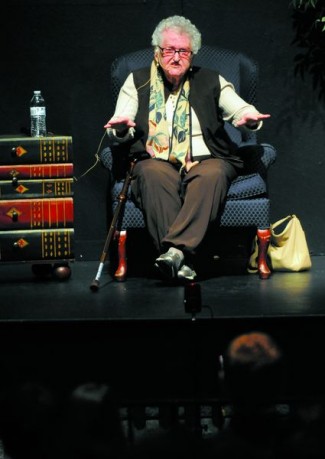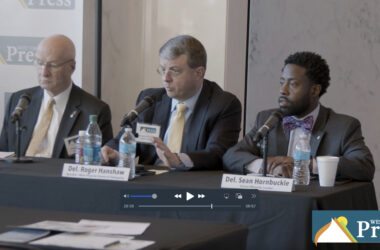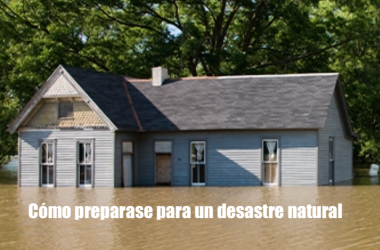
Ninety-year-old Anna Grosz shares her life story as a Holocaust survivor with students at Hedgesville High School on Thursday morninig. She and her three sisters were forced to march with over 700 people. She estimated only 230 survived.
HEDGESVILLE, W.Va. — Anna Grosz was born in 1926 just outside of Translyania, Romania. She was the fourth of six girls in her family and lived in a small town of about 1,000 people that consisted of about 50 Jewish families.
Grosz, 90, is one of the dwindling number of survivors of the Holocaust and came to Hedgesville High School on Thursday morning to share her story with students and the community.
Around 500 social studies students packed the school’s auditorium to here Grosz’s speech. Other students in the school as well as throughout Berkeley County were able to tune in and watch and listen over a live-streaming broadcast.
During World War II, at the age of 14, Grosz was no longer allowed to attend school. In 1942, her father’s vineyard (he was a wine merchant) was confiscated and he was forced to leave the family and go into the Hungarian Labor Service. Grosz said the family received only one letter from him, and he was never seen or heard from again.
In May 1944, Grosz, her mother and sisters, along with other Jews from the surrounding towns, had to move into a ghetto. Shortly after, Hungarian authorities ordered all the Jews to report to the train station where Grosz was the 92nd person to get into a boxcar that took them to Auschwitz.
Grosz described how, when she and her family arrived, they were immediately seperated. Grosz’s mother, oldest sister and youngest sister went one way as Groz and her other three sisters went another way. Grosz described how this occured because she and her other three sisters were chosen for forced labor. They were forced to wear old dresses labeled with a number and weren’t given any undergarments. They also were forced to cut off all their hair.
Grosz said her mother and two of her sisters were never seen again; they were killed the first night they arrived to Auschwitz.
Four days later, Grosz and her remaining sisters were sent to another concentration camp, where they worked planting and harvesting vegetables. During the course of her stay, Grosz broke her leg. She said it was a miracle she was not killed because of her injury.
In Feb. 1945, most of the prisoners, including Grosz’s sisters, were forced to evacuate and march on foot, but Grosz was left behind because of her injury. Grosz said she thought she would never see them again.
In March 1945, Soviet troops liberated prisoners, including Grosz. After liberation, Grosz fought her way back home, where she reunited with two of her sisters, finding out that one had been shot and killed during the march.
In 1947, Grosz met her husband and they had two sons. In 1964, the family emigrated from Romania to New York City. Grosz now lives in the Washington, D.C., metropolitan area and is a volunteer at the United States Holocaust Memorial Museum.
Grosz said it is her responsibility to tell and share her story.
“I feel somehow ashamed that I can talk about it and I do not let tears come to my eyes. The suffering made me stronger somehow. Because very few survivors want to do this job, because they don’t want or they can’t talk about it,” Grosz said.
“This is a job, an important job to do, and it makes me stronger to do that. But don’t you think that I don’t have sad moments, because at night I can see and relive what happened to me. … But miracles happen and I am still here,” she added.
Grosz told the students with all she went through, she really misses that fact that she was unable to get a proper education.
“I missed the education in my life, I missed it very, very much. I feel that I could be more than I am because I was ambitious just like my children and I couldn’t have any schooling, I couldn’t go to school. You should be happy that you get that and have that,” Grosz said.
“You know, young people, the future is in your hands. And that’s a big thing, because my future was taken, killed. But you live in a country where you can be what you want to be, if you have the will to do that,” she added.
History teacher Craig Butts helped organize the event and said it was a once-in-a-lifetime opportunity for the students.
“The opportunity to hear a firsthand account of something that they have read about and studied, it helps make history alive and real, not just something in a book, it’s real people. It’s Anna, it’s her sisters, it’s her mom and dad, and I think that is the important part,” Butts said.
Senior Tyler Cole said listening to Grosz’s story inspired him.
“It’s someone that’s emotional about it and explains the atmosphere,” Cole said. “She was there and went through it and lost loved ones. They were starving, hungry, cold and she was about to die. Since she was in that situation, it just really inspires me at least to not take any of this for granted, even though people complain about it, it’s definitely an amazing opportunity that we can come to school every day to get our education.
“Someone having to go through what she went through and then being able to come here and tell students to better their life and to get the education to make the world a better place is just amazing,” Cole added.
Senior Cheyenne Martin said Grosz helped put things into prospective for her.
“It really moves you to not take your days for granted. Even when you think you are having a bad day, someone else could have it way worse.”
Butts said that as a history teacher, that’s what he strives for every day, to make history come alive.
“I want to get people to appreciate how we got here, we didn’t just show up here,” Butts said. “We all have personal histories, we have a state history, we have a country and a world with a history, and it’s all tied together, and I think understanding that helps you find your place in the world.”
Grosz said she believes education is the hope for a better world.
“Education, just that one word means a lot, because an educated person thinks and sees differently, and sometimes when a person isn’t educated, they don’t know or won’t believe that things like this happened,” Grosz said.
Staff writer Katiann Marshall can be reached at 304-263-8931, ext. 182, or [email protected].






